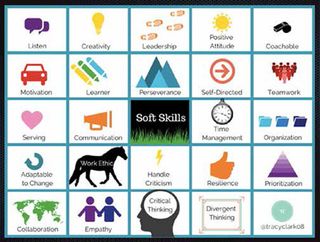Language Arts, Math, Science, and Social Studies. For decades, these subjects have been the staple of the modern American educational system. While all of these subject areas play a role in the development of our youth, they are based on career needs from the mid-20th century.
If we were starting the American school system from scratch today, knowing what skills our students will need, we could choose different subjects that aren’t based on what big-time publishers want us to focus on with our students. Building on some of the great work from FutureReady.org and the ISTE Standards for Students, and keeping in mind the job skills that employers from Fortune 500 companies look for when hiring (see chart by Tracy Clark (@tracyclark08), I would propose the development of the following seven courses for every student:
■ Collaborative Outreach—A way for students to serve the communities around them, but also to work in teams, plan projects, and practice empathy.
■ Entrepreneurialism—Thinking “outside-the-box,” but in a class form. Many of the ideas from this class could work hand-in-hand with the other courses listed here. Again, working in teams, students create solutions or products with the goal of developing the entrepreneurial spirit.
■ Communication and Design—Oral and written communications still play a major role in our current system, and by all accounts they will continue to be important. However, what about visual communication? What about making a visually pleasing presentation to pitch a product or reflect on an outreach opportunity? This course would teach those skills.
■ Creative Expression—Having outlets to express yourself creatively and time for passion projects are huge in the workplaces of Google and Apple. The same should be true for schools. This course could be all about an app you are designing or a sculpture you are trying to complete (either by hand or through 3D printing).
■ Critical Problem-Solving—Much of the curriculum from math and science would fall into this course, although elements would be sprinkled in the other courses (e.g., economics in the entrepreneurial course and science in the environmental mindfulness and collaborative outreach courses)
■ Investigative Thinking—This course takes many of the research skills taught in social studies and applies them with a twist. How can looking back and investigating history help predict future outcomes? Traditional statistics would play a role in this course too.
■ Environmental Mindfulness—We need to allow time for students to be outside and/or active during the traditional school day. We also need to allow time for students to reflect on what they have learned and set goals for the future.
If we really want to prepare kids for what’s next, whether that be a high-tech career or work in the service industry, we need to transition our curriculum to incorporate areas that will help them to be more successful in a highly automated future.
Carl Hooker (@mrhooker) is the director of innovation and digital learning at Eanes (TX) ISD. Read more at hookedoninnovation.com.

